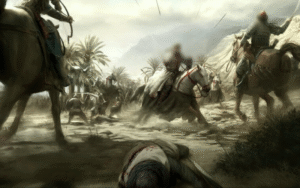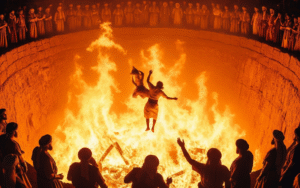The Story of Abraha and the Elephant: A Miracle in History

Throughout history, people of all nations and faiths have universally recognized the Holy Kaaba for its honor and sanctity. Also known as the Baytullah, it was the first house of worship established on Earth. Even during the pre-Islamic era of ignorance (Jahiliyyah), people revered it as the sacred symbol of Abraham’s monotheistic faith (Millat-e-Ibrahimi). Consequently, it stood as a center of pride and devotion. The Holy Quran is not merely a book of scripture; it is a source of guidance for humanity and a reliable historical record. In it, Allah (God) mentions stories of past nations so that humankind may learn from them. One such historic event is the story of Abraha and the elephant, a miraculous account narrated in the Quran as the Surah Fil story.
The Motives Behind the Kaaba Attack by Abraha
During that period, the sacred Kaaba had become a source of envy for the powerful Roman Christians in the surrounding regions. As a result, they constantly schemed for ways to diminish its international importance in the eyes of the world. This conspiracy eventually took a tangible form through the actions of a Christian ruler in Yemen named Abraha al-Ashram.
Abraha’s Identity and Motive:
According to various narrations, Abraha’s reign lasted from 525 to 570 CE. People knew him as “Abraha al-Ashram,” or Abraha the scar-faced, because a past battle had cut his nose and lip. Initially, he was a general for the Negus, the King of Abyssinia. He later became the governor and then the independent king of Yemen. Abraha observed that the Arabs were deeply devoted to the Kaaba in Makkah, flocking there annually for pilgrimage (Hajj). Moreover, the offerings and gifts presented by pilgrims made the Kaaba a center of immense economic and social importance. Abraha could not resist the temptation to divert this honor and wealth toward his own kingdom.
The Rival Church and Its Failure:
To achieve his selfish goal, Abraha constructed a magnificent cathedral in Sana’a, the capital of Yemen. He named it ‘Al-Qullays.’ Using marble and exquisite craftsmanship, Christians spared no expense on its construction. After its completion, Abraha informed the King of Abyssinia that he would divert the Arab pilgrimage from the Kaaba to this new church. However, the Arabs still held the Kaaba’s sanctity above all else, even though they had nearly forgotten the details of Abraham’s religion. Therefore, they rejected his call with contempt.
The Vow to Destroy the Kaaba:
Abraha’s plan ultimately ended in humiliating failure. One narration states that a man from the loyal Arab community of Bani Kinanah entered the cathedral and desecrated it by defecating inside. Another narration says some Arabs lit a fire nearby, and the wind carried sparks that set the church ablaze. When Abraha heard this news, rage consumed him. He then swore a mighty oath: he would retaliate for this insult by completely destroying the Kaaba.
The Historic Story of Abraha and the Elephant
Enraged, Abraha gathered a massive army to march on Makkah. He also procured several elephants from Abyssinia to aid his destructive goal. At the head of his forces was a colossal elephant named ‘Mahmud.’
The Army and Its Brutality:
There are differing accounts of the army’s size. Some sources claim it was 40,000 strong. In contrast, the ancient Arab poet Abdullah ibn Jarari mentioned a force of 60,000 soldiers. As Abraha marched towards Makkah, he mercilessly crushed the Arab Groups that tried to stand in his way. Upon reaching a place called ‘Mughammam’ near Makkah, he ordered his troops to plunder the livestock of the local Arabs.
The Faith of Abdul Muttalib:
The Quraysh, the custodians of the Kaaba, had no military power to confront such a colossal army. Their leader, Abdul Muttalib, who was the grandfather of the Prophet Muhammad (ﷺ), advised the people of Makkah to seek refuge in the nearby mountains. Abraha’s forces also seized 200 of Abdul Muttalib’s own camels. Fearlessly, Abdul Muttalib went to Abraha’s camp to demand his camels back. Abraha was surprised and said, “I have come to destroy your house of worship, yet you say nothing about it and ask only for your camels?” In response, Abdul Muttalib delivered his historic words of faith: “I am the owner of the camels, so I have come for them. As for the House (the Kaaba), it has its own Lord, and He will protect it.” Stunned by this reply, Abraha returned his camels.
A Prayer to Allah:
After returning from the camp, Abdul Muttalib went to the Kaaba with a few companions. Holding the knocker of the Kaaba’s door, he prayed for its protection. He recited a poem with a simple essence: “O Allah! A man protects his own house, so you too protect Your House.” Following this prayer, he and the rest of the Quraysh took shelter in the mountains.
Allah’s Miraculous Punishment: The Ababils Birds Story
The next morning, Abraha ordered his army to advance and demolish the Kaaba. It was at this moment that Allah’s miraculous power became manifest.
The Elephant’s Defiance:
The lead elephant, ‘Mahmud,’ refused to move towards the Kaaba and knelt on the ground. No matter how hard the handlers tried, they could not make it face the sacred house. At that very moment, a divine intervention began. Flocks of black birds with green necks, known as ‘Ababil’ birds, appeared from the direction of the sea.
Destruction by Stones:
Each bird carried three tiny stones of baked clay (‘sijjil’)—one in its beak and two in its claws. The birds flew over Abraha’s army and began dropping the stones on the soldiers. According to some traditions, each stone had the name of the soldier it was destined to strike. When a stone hit a soldier on the head, it would pass through his body. This caused his flesh to disintegrate as if it were chewed-up straw. The Surah Fil story vividly describes this divine punishment.
The Horrific End of Abraha:
In an instant, the entire mighty army was annihilated in the valley of ‘Muhassab.’ Abraha himself was severely wounded. He attempted to flee back to Yemen, but his body began to rot away during the journey. Ultimately, he died a painful and humiliating death. It is said that almost none of the 60,000 soldiers survived to return. This terrifying end serves as a key lesson in the story of Abraha and the elephant.
Quranic Verses: The Divine Narration of the Surah Fil story
Allah immortalized this entire event in Chapter 105 of the Holy Quran. The chapter is named ‘Al-Fil’ (The Elephant) after the army that Abraha led.
بِسْمِاللَّهِالرَّحْمَٰنِالرَّحِيمِ
أَلَمْتَرَكَيْفَفَعَلَرَبُّكَبِأَصْحَابِالْفِيلِ(١)
أَلَمْيَجْعَلْكَيْدَهُمْفِيتَضْلِيلٍ(٢)
وَأَرْسَلَعَلَيْهِمْطَيْرًاأَبَابِيلَ(٣)
تَرْمِيهِمبِحِجَارَةٍمِّنسِجِّيلٍ(٤)
فَجَعَلَهُمْكَعَصْفٍمَّأْكُولٍ(٥)
Translation:
- Have you not seen how your Lord dealt with the companions of the Elephant?
- Did He not make their plot go astray?
- And He sent against them birds in flocks,
- Striking them with stones of baked clay.
- And He made them like eaten-up straw.
Lessons from the Story
The story of the Army of the Elephant offers profound lessons for all time:
- The Sanctity of the House of Allah: The Kaaba is the House of Allah. Anyone who tries to destroy the symbols of Allah’s religion will find that Allah Himself is sufficient to stop them.
- The Limits of Human Power: No matter how advanced human power or military might may be, it is insignificant before the power of Allah. For instance, tiny birds defeated Abraha’s massive army.
- Complete Trust in Allah (Tawakkul): Abdul Muttalib’s character teaches us to place our complete trust in Allah, especially in times of helplessness. Indeed, when all worldly means are exhausted, Allah’s help is the only true support.
Conclusion: Legacy of the Year of the Elephant
The event of the Army of the Elephant had far-reaching consequences. After this miracle, the respect and honor for the Quraysh community grew immensely throughout Arabia. Makkah subsequently became renowned as a safe and sacred city, which later facilitated the spread of Islam. This incident occurred in the same year as the birth of the beloved Prophet Muhammad (ﷺ). As a result, that year became known in history as the ‘Am al-Fil’ or the “Year of the Elephant.”
Even today, this story teaches us that the ultimate protector is Allah alone. True safety does not come from superpowers or worldly resources but from relying on Him. In the end, the downfall of human arrogance is inevitable, and the plan of Allah will always prevail.
Frequently Asked Questions
Who was Abraha, and what was his motive for attacking the Kaaba?
Abraha al-Ashram was a Christian ruler of Yemen. He was filled with envy and arrogance after failing to divert the pilgrimage of the Arabs to a magnificent church he built in Sana'a. His motive for attacking the Kaaba was to retaliate for its desecration by an Arab, to destroy the Kaaba's religious and economic importance, and to redirect the Arabs' devotion toward his own kingdom.
What are the key details of the "Army of the Elephant" story?
Abraha gathered a massive army, including a colossal elephant named "Mahmud," to march on Makkah. When the army was about to attack the Kaaba, the lead elephant refused to move. Then, flocks of small birds, known as Ababils, appeared. Each bird carried three stones of baked clay (sijjil) and dropped them on Abraha's army, causing their bodies to disintegrate like chewed-up straw and wiping out the entire force.
What is the significance of the "Year of the Elephant"?
The "Year of the Elephant" (Am al-Fil) is the name given to the year in which this miraculous event occurred. It is a highly significant year because it is also the year the Prophet Muhammad (ﷺ) was born. This event established the sanctity of Makkah and the Kaaba and demonstrated Allah's protection of His sacred House.
What are the main lessons from the Surah Fil story?
The story of Surah Al-Fil offers several profound lessons:
- The Kaaba is a sacred house protected by Allah.
- No matter how powerful a human or military force may be, it is insignificant before the power of Allah.
- A believer should place complete trust in Allah (Tawakkul), especially when all worldly means are exhausted. The story of Abdul Muttalib's reliance on Allah is a powerful example of this.









